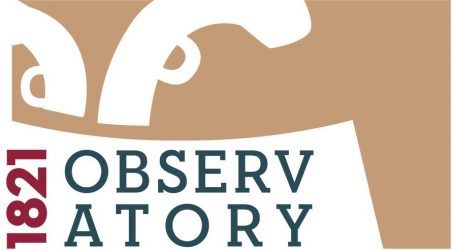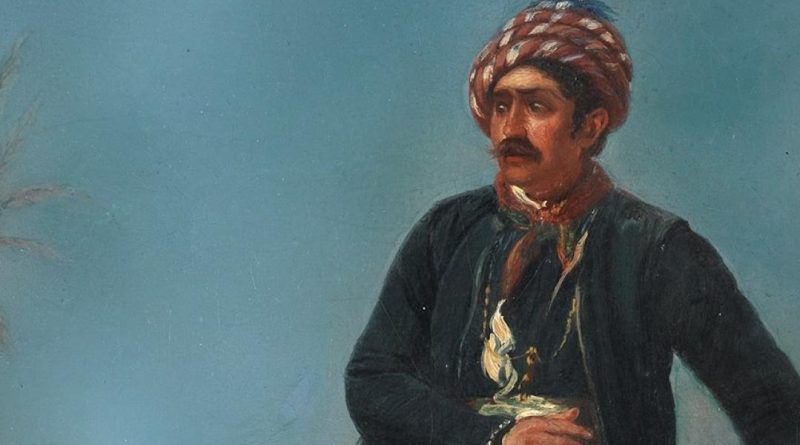Academic research and new themes on 1821
The growing demand for history and memory, since the end of the 20th century, indicates the desire for the management of the past by subjects, collectives and institutions, whether or not they have a historical education, because they seek from the past identity, reflection, emotion, even and justice.
The anniversary year 2021 was the motivation for activating official and unofficial authorities, collectives and individuals, to declare their presence in the national present with an unprecedented explosion of activities, which aim at reinterpreting, reflecting, highlighting the achievements of the nation or the new identities that confront the founding period of the nation.
At Democritus University we have created an Observatory for 1821 (Regional Excellence NSRF) in order to record these activities and create an interactive digital archive that includes them; in turn this Observatory will be the basis for analysis of the nation’s ideas about itself, as well as the rest of the world when it thinks of Greece, as outlined in the second decade of the 21st century.
The dividing lines between academic historians, and those who deal with history without special studies are becoming increasingly blurred. This is the reason why our efforts were focused on creating an inclusive archive, where academic and public history meet. Our purpose is not just to build a silent archive but to open a dialogue with all those who want to immerse themselves in the anniversary of 1821 as seen by the university, electronic and print journalism, visual artists, theater, music, schools, the Church, municipalities, and even social media.
However, the present article shall discuss the new themes that have surfaced in academic research on the occasion of the Bicentennial of the 1821 Revolution. Indeed, academic research has contributed in both volume and quality publications, culminating in the years around 2021 in the research of perhaps the leading event in modern Greek history. Additionally, several new topics and illuminated hitherto unexplored aspects of the Greek revolution have been highlighted.
Perhaps, one of the most discussed new topics that emerged from the academic research is that of the connection of the Greek revolution with the so-called Age of Revolutions. The transnational dimentions of 21, with the exception of the phenomenon of philhellenism, were an unexplored aspect of the revolution, something that has been overturned in recent years. Already in 2016, the book Freedom Fighters: The Greek Revolution in its Transnational Dimension (Pedio) was published, in which Anna Karakatsouli highlighted the connection of the philhellenic movement with the “Liberal International” and its revolutionary action that covered the “Global South “. In a similar climate, The Noblest Cause: The Greek Revolution of 1821 (Papadopoulos, 2021) by Aristides Hatzis highlights the liberal character of the Greek revolution, tracing its connection to the international reality.
Another new theme was the reception of the revolution by the Ottoman administration through the research of Ottoman archives. The most important publication was that of the volume “Those Infidel Greeks”: The Greek War of Independence through Ottoman Archival Documents by Brill (2021, ed. H. Şükrü Ilıcak). This volume includes English translations of select documents from the Ayniyat Registers on the Greek War of Independence preserved in the Ottoman State Archives. In The Wrath of the Sultan: Autograph Decrees of Mahmut II in 1821 (HOU Publications, 2021) Elias Kolovos, Sukru Ilizak and Mohammad Shariaat-Panahi show the reaction of the Ottoman state to the rebellious “Rayas”, as seen by Ottoman officials and decrees of Sultan Mahmud II. Respectively, Leonidas Moiras presents the reception of the national liberation Struggle by the Ottomans through rich archival material in his book The Greek Revolution through the eyes of the Ottomans (Topos, 2020). The work of Sofia Laios and Marinos Sarigiannis Ottoman Narratives of the Greek Revolution moves in the same direction (Institute for Historical Research, 2019). The book by Dimitrios Papastamatiou and Phokion Kotzageorgis On the fringes of the Revolution: A new approach of the struggle in Halkidiki based on Ottoman archival material (HOU Publications, 2021) offers – in addition to the Ottoman view of the revolution – information about the revolution in Halkidiki. Of particular interest, however, is Christine Philiou’s book, Biography of an Empire: Governing Ottomans in an Age of Revolution (originally in English- University of California Press, 2010, in Greek- Alexandria, 2022), which tells the story of a Phanariot who decided to remain loyal to the Ottoman regime.
Another new theme is that of the memory of the revolution; how were older, corresponding anniversaries celebrated and how do we remember the revolution in these two hundred years of life of the Greek state at the level of public history? In the book Fustanellas and Togas: Historical memory and national identity 1821-1930 (2020, Alexandria) Christina Koulouri studies the issue of shaping national memory through a number of sources, such as the depiction of the revolution in art and public ceremonies. In addition, in Art & Historical Consciousness in 19th Century Greece: Image, History, Education (2021, Gutenberg), Angelos Palikidis analyzes the iconography of the revolution, shedding light on the beginning of the formation of the memory of the Struggle.
In addition, the research on how the revolution was experienced by women should be especially mentioned, not only by the “famous” heroines of 21, but also by the many, anonymous women who participated in it in various ways, but were also called to suffer its consequences. A typical example is Vasiliki Lazou’s book, 1821: Women and Revolution. From the Ottoman world to the liberated Greek state (2021, Dioptra). At the same time, a similar new field of research on the revolution is the experience of the civilians, and more specifically of the “orphans of the revolution.” Gonda van Steen, Thomas Gallant and Iakovos Michailidis have spoken about this issue at conferences but their research is under publication.
Furthermore, research was not limited to the strictly academic context, but books were also published with the aim of contributing to public history and public debate. The series 200 years since the Revolution: The protagonists – the decisive issues by Metaichmio publications, edited by Iakovos Michailidis, addresses some key issues of the Struggle and analyzes the contribution of some of its leading protagonists. In addition, the first Greek graphic novel about the Greek revolution was published, entitled 21 The Battle of the Square (2021, Ikaros), which is perhaps the most original project of public history and is the result of a research project of the University of the Aegean (funded by HFRI). Finally, many attempts were made to review the course of the Greek state in order to look critically at the two hundred years of its existence. However, in view of the two hundred years anniversary of the Greek state in 2030, other works with this theme are expected to be released in the coming years.
Athena Syriatou, Assistant Professor of Modern and Contemporary History DUTH
Konstantina Tortomani, Postdoc researcher in modern and contemporary European history at the Department of History and Ethnology, Democritus University of Thrace
This article is republished from the supplement “Anagnoseis” of the newspaper Avgi. First publication: Syriatou A. and Tortomani K., Research and New Themes for 1821 (original in Greek Έρευνα και Νέες Θεματικές για το 1821), 27/03/2022.

